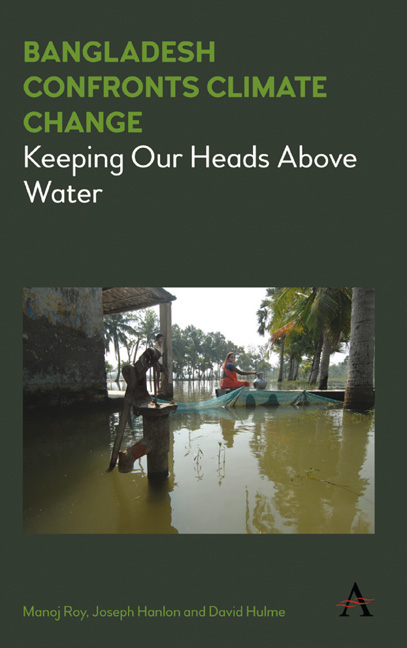Book contents
- Frontmatter
- Content
- List of Illustrations
- Abbreviations, Acronyms and Bangladeshi Terms
- Acknowledgements
- About the Authors
- Chapter One Actors, Not Victims
- Chapter Two How Will Climate Change Hit Bangladesh?
- Chapter Three Taking the Lead in Negotiations – and Moving Forward
- Chapter Four Sea Level Rise and the Vulnerable Coast – Where Farmers Know More than Engineers
- Chapter Five Saving Lives with Cyclone Shelters
- Chapter Six Living with Floods
- Chapter Seven Agronomists Keeping Ahead of Climate Change
- Chapter Eight No Climate Change Migrants – Yet
- Chapter Nine How Can the Privatized Megacity Cope with Climate Change?
- Chapter Ten Is Climate Change Only a Problem for the Urban Poor?
- Chapter Eleven Power – Political, Financial and Electrical
- Chapter Twelve Bangladesh on the Front Line of Climate Change
- Index
Chapter Three - Taking the Lead in Negotiations – and Moving Forward
Published online by Cambridge University Press: 22 July 2017
- Frontmatter
- Content
- List of Illustrations
- Abbreviations, Acronyms and Bangladeshi Terms
- Acknowledgements
- About the Authors
- Chapter One Actors, Not Victims
- Chapter Two How Will Climate Change Hit Bangladesh?
- Chapter Three Taking the Lead in Negotiations – and Moving Forward
- Chapter Four Sea Level Rise and the Vulnerable Coast – Where Farmers Know More than Engineers
- Chapter Five Saving Lives with Cyclone Shelters
- Chapter Six Living with Floods
- Chapter Seven Agronomists Keeping Ahead of Climate Change
- Chapter Eight No Climate Change Migrants – Yet
- Chapter Nine How Can the Privatized Megacity Cope with Climate Change?
- Chapter Ten Is Climate Change Only a Problem for the Urban Poor?
- Chapter Eleven Power – Political, Financial and Electrical
- Chapter Twelve Bangladesh on the Front Line of Climate Change
- Index
Summary
Because climate change accentuates existing environmental problems in Bangladesh, its scientists could see clearly what was coming, and they have taken a leading role in the annual climate change negotiations, the COP talks, and in putting pressure on the industrialized countries. Their stress has been on two issues, pressing for the least possible temperature rise and putting on to the agenda the industrialized countries’ responsibility for the damage they have already caused. As a new country but with an ancient culture that honours learning, Bangladesh put together knowledgeable, dedicated and hard-working negotiating teams. They played a key role in the interminable backroom negotiations, forcing the industrialized nations to take seriously the expertise from developing countries and pushing into agreements the key phrases that mean industrialized countries must recognize their responsibility for global warming.
Annual COP meetings are presented by the media in binary terms, as a failure or as a breakthrough. And to some extent they are. Meetings run all night and into extra days as world leaders struggle to reach compromises to curb climate change while protecting their national interests. But in this very technical arena, it is expert teams who lay the groundwork for the final compromises. And the agenda is set in the permanent, ongoing technical meetings where, very quietly, opinion is changed – ideas that seemed impossible a few years earlier come to be seen as reasonable and normal. This reflects better science and modelling, making clear the dangers of unabated climate change, as well as improved understanding of how emissions can be cut. The Bangladeshi expert negotiators have taken a major role and added significantly to this incremental progress.
Making an International Mark
In 1986 Saleemul Huq and others set up the Bangladesh Centre for Advanced Studies, in part to research the environment, and were joined by Professor Atiq Rahman. Major floods in 1987 and 1988 hit Bangladesh just as pioneering research on sea level rise was being published by the Woods Hole Oceanographic Institution, Massachusetts, US. Huq and Rahman realized just how serious the impact on Bangladesh might be – ‘all of Bangladesh might be under water, and we had better worry’, Rahman said. A first book discussing this was published in 1990.
- Type
- Chapter
- Information
- Bangladesh Confronts Climate ChangeKeeping Our Heads above Water, pp. 29 - 40Publisher: Anthem PressPrint publication year: 2016



